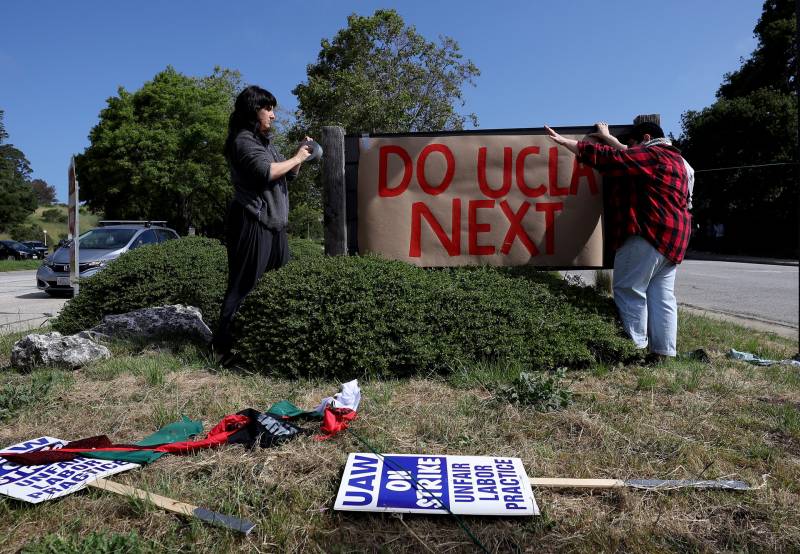“Rather than put their energies into resolution, UC is attempting to halt the strike through legal procedures,” UAW 4811 President Rafael Jaime said in a statement.
University officials have called the strike illegal, filing an unfair labor practice suit against the union in response.
“UAW’s decision to strike over nonlabor issues violates the no-strike clause of their contracts with UC and sets a dangerous and far-reaching precedent,” Melissa Matella, associate vice president of systemwide labor relations, said in a statement last week.
About 1,500 graduate teaching assistants, researchers and other academic workers at UC Santa Cruz walked off the job on Monday, the first campus to go on strike after an authorization vote by union members last week. With a number of entrances blocked by picketing on Tuesday and Wednesday, UCSC temporarily transitioned to all virtual classes.
The union argues that the university has engaged in unfair labor practices, created unsafe working conditions and violated members’ rights in its response to pro-Palestinian protests on several campuses. That includes at UCLA, where police earlier this month took hours to intervene when counter-demonstrators attacked pro-Palestinian protesters at the campus’ original encampment but then proceeded to violently break up the same encampment and arrest more than 200 activists the next night. There were also crackdowns at UC Irvine, where 47 protesters were arrested last week, and UC San Diego, where 64 people were arrested in early May.
Emily Weintraut, the UAW 4811 academic student employee unit chair at UC Davis, said she was disappointed that the university administration didn’t resolve the strike amicably. The group represents 5,700 workers at UC Davis.
“I’d say that we only called the strike because there were such severe health and safety violations, such severe, unfair labor practices,” she said. “And it’s disappointing that the university, rather than when we asked multiple times to talk with us and de-escalate the situations, decided to file the injunction.”
The strike authorization passed with 79% of the vote, according to the union — but voter turnout was low — only 19,780 of UAW 4811’s approximately 48,000 members cast ballots. The decision to utilize what are known as rolling strikes, where individual campuses are called on to strike at different times, was made to have a greater impact and “maximize chaos,” union leaders said at the time.
It’s not yet known how long the strike will last or if it will extend to other campuses, but it could go until the end of June. Most campuses finish classes in the next few weeks.

